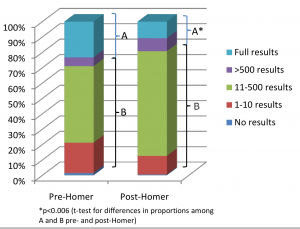 In PLoS Genetics this week there is a viewpoint article on data sharing in disease genetics. The authors systematically looked at 643 genome-wide association studies published between 2002 and 2010, to see how easily available the results of the studies are now. They found that the availability of full study results has gone down over time, and many groups that do share data have put more restrictions in place on its use. They put this down to fears over the privacy of research subjects, and in particular to the Homer et al study. The Homer et al result is somewhat complicated, but in essence it says that if you have stolen someone’s genotype data, you can use it to figure out if they have participated in any given research study by looking at the full results of the study.
In PLoS Genetics this week there is a viewpoint article on data sharing in disease genetics. The authors systematically looked at 643 genome-wide association studies published between 2002 and 2010, to see how easily available the results of the studies are now. They found that the availability of full study results has gone down over time, and many groups that do share data have put more restrictions in place on its use. They put this down to fears over the privacy of research subjects, and in particular to the Homer et al study. The Homer et al result is somewhat complicated, but in essence it says that if you have stolen someone’s genotype data, you can use it to figure out if they have participated in any given research study by looking at the full results of the study.
It certainly seems possible that worries about privacy are reducing the free flow of information within the research community. However, whether on balance the decrease in information flow is worth the increase in security is an open question. For my own view, I feel that having the genome-wide results of genome-wide association studies freely available is very important to the field, and is more important than the the rather esoteric risk of someone stealing someone’s DNA and using it to figure out that they once took part in a research study of inflammatory bowel disease. [LJ]
 Genome-wide association studies have been hugely successful in identifying dozens of common genetic risk factors for a large number of common diseases. However, one area that GWAS has not had much success in is the field of psychiatric illness, where finding common risk factors that replicate across studies has been consistently difficult. However, it looks like this is starting to change. The current issue of Nature Genetics has two papers from the Psychiatric GWAS Consortium, detailing some of the largest meta-analyses of schizophrenia and bipolar disease ever published.
Genome-wide association studies have been hugely successful in identifying dozens of common genetic risk factors for a large number of common diseases. However, one area that GWAS has not had much success in is the field of psychiatric illness, where finding common risk factors that replicate across studies has been consistently difficult. However, it looks like this is starting to change. The current issue of Nature Genetics has two papers from the Psychiatric GWAS Consortium, detailing some of the largest meta-analyses of schizophrenia and bipolar disease ever published.
The schizophrenia study robustly replicated two previously implicated variants, and discovered five new ones, and the bipolar disease study replicated one and discovered a new one. The new variants give us some pretty startling insights into the genetics of the diseases, in particular revealing the importance of a non-coding gene micro-RNA 137 in regulating a wide range of genes expressed in neurons. As always, these variants explain only a small proportion of the total genetic effect, but they show that psychiatric genetics has now truly entered the GWAS arena, with all the scientific benefits that this can bring to medical research. [LJ]
The images above, in order, are taken from the paper Temporal Trends in Results Availability from Genome-Wide Association Studies, and from Wikimedia Commons.








 RSS
RSS Twitter
Twitter
Something that I have missed in the article regarding sharing of GWAS data is that no specific solutions are provided. It is right in pointing that we are in urgent need to readdress the balance between data sharing and protection of privacy.
The only realiable solution I see to being able to access personal genome data (especially from NGS) is to allow controlled access by authorized acccounts.
You are missing one obvious and boring issue: money. As studies go bigger and bigger, as well as given the current global economic climate, there is an incentive for researchers to show ‘value for money’ to their funding bodies. That means controlling access to data, in a way to guarantee return of investment i.e. credits/involvements to papers utlitizing that data.
It is about squeezing the last bit of value out of their investment.
@”William Gates”
Most funders now mandate the sharing of data acquired with public funds, at least with bona fide researchers. Many journals do too. The PLoS Genetics paper is about whether the threat to study subject privacy (as identified by Homer et al, 2008) is being taken seriously by authors. The answer appears to be “yes”, as many of the studies investigated now put their results in appropriately access-controlled repositories.
The worry is then:
[a] some did not comply with recommendations, and still left their data out in the public domain;
[b] some found the issues too difficult to address, and therefore chose not to make the results available at all.
Perhaps a greater concern is that the data that is supposedly available, is in fact not so, see:
http://www.plosone.org/article/info:doi/10.1371/journal.pone.0024357
Alsheikh-Ali, AA et al (2011)
Public Availability of Published Research Data in High-Impact Journals
PLoS ONE 6(9): e24357. doi:10.1371/journal.pone.0024357
One would hope that the funders would step in if it turns out the researchers they fund are only paying lip service to the data sharing ideals they espouse.
There are many varieties of range of credit rating. Everyone really has lots of fico scores to the range of credit rating product since all of three country wide credit agencies, Equifax, Experian along with TransUnion, possesses its own databases. Range of credit scores possess diverse titles each and every of the diverse credit scoring businesses: Range of people’s credit reports are employed by simply 90% in the loan companies.